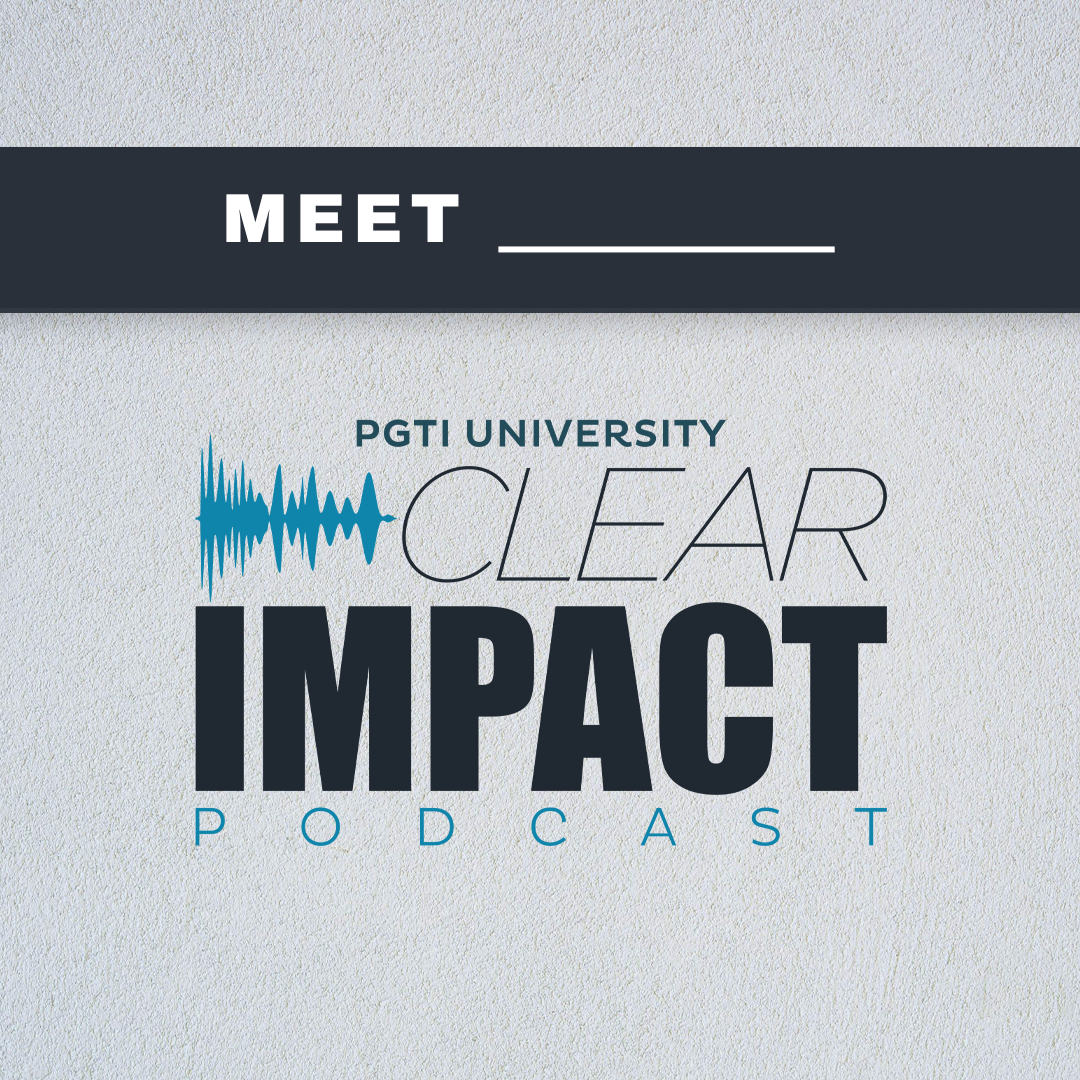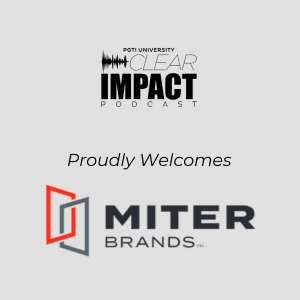Episode Transcript
Speaker 1 00:00:05 Welcome to the clear impact podcast brought to you by P G T I university. Thanks for joining us today. My name is Sherry Connor and I am your host.
Speaker 2 00:00:19 We get calls every day about white labels missing, possibly cleaners took them off, or the homeowners got a little anxious and took them off before inspection. So,
Speaker 1 00:00:30 And, and we charge them like what a thousand dollars every time we have to do that,
Speaker 2 00:00:34 This is a free service
Speaker 1 00:00:35 That
Speaker 2 00:00:36 Is provided by
Speaker 1 00:00:37 PGC. Oh no. Okay.
Speaker 2 00:00:41 It keeps us very busy.
Speaker 1 00:00:42 Yeah. And it's just unnecessary. I mean, just keep the label. Don't take the labels off. Don't take the labels off,
Speaker 2 00:00:48 Right?
Speaker 1 00:00:49 <laugh> don't take the labels off.
Speaker 2 00:00:50 Big flashing, flashing neon lights. Please leave this on. Yes,
Speaker 1 00:00:54 There are a few different labels on our products and these are very necessary. Lisa Wilson and Lynn Miller wrap up our final episode of windows and doors 2 0 1 series today. We discuss all the labels, why they are there and why the information on them is worth keeping. Good morning. We are here on the clear impact podcast, and we're actually wrapping up this series around windows and doors 2 0 1. And we have in studio with us today. We have Alex who is running our soundboard and Lisa Wilson is with us. And also Lynn Miller is back with us and we are gonna be talking about labels and all the different labels and why they're important. And what the questions are that you guys get asked on a regular basis about the labels. So there are a few different labels that we have on our products. And so what do they mean and why are they important?
Speaker 2 00:01:44 Well, we do have a few different labels. We have a structural certification label. We have a thermal certification label, and then we also have a temporary label that we use that gives descriptions. So I would call that more for, um, inspection purposes. Okay. Helps inspectors out. The gold label, as I was talking about is for certification purposes. And on there we'll list, what testing that was done to, if it was done to Moff, it was done to Taaz or D protocols. Then our silver label, we called our N FRC label showing that the product is N FRC certified and went through the thermal testing. And then our white label will give you the description of the window, the size, the glass makeup, the tints, the color design pressures, thermal values, if it meets energy star or not. Okay.
Speaker 1 00:02:32 And are the labels required on products like everywhere or is this just a Florida thing or what is that? Do you know?
Speaker 2 00:02:40 The structural certification labels are required throughout the country. That is in the building codes. Florida also has the temporary labels. So the white, temporary labels is a Florida code mm-hmm <affirmative>, but we put those on all of our products regardless of where they're being sent to. Okay. And we really think that gives the inspectors out in the field, a heads up makes it their job so much easier when all the information is right there. Mm-hmm <affirmative>
Speaker 1 00:03:04 Well, right, because they're making sure that the design pressure on the window lines up with the design pressure of the opening, which we learned in the earlier episodes of this series. So the processes, they order the window, the window comes out, it gets installed, it gets inspected. Then what do you do? You just scrape that label off and throw it in the garbage, should you put it in a notebook? Like what should a homeowner do
Speaker 2 00:03:25 Around that? So it should be left on, okay. The gold and silver labels that you will see on your products that come from any of our companies should be left on permanently. Those are permanent labels. However, the temporary white label that's on the glass. Mm-hmm <affirmative> please, please, please again, leave that on until after inspection. Okay. And then I would suggest that the homeowners say that they can put it in a scrapbook, put it in their files because that does come in handy. If something is to happen to the unit, say, you need a new screen or someone, you know, is playing baseball in the yard and breaks that window. And you a new glass, that label is so beneficial. Mm-hmm <affirmative>, which can take us right. To what you had and you can get a replacement, right.
Speaker 1 00:04:05 Or take a picture of it.
Speaker 2 00:04:06 Yeah, yeah. Or take a picture.
Speaker 3 00:04:07 Yeah. It has information. It has sales order information on it. Like, like Lisa mentioned specific sizes. So there's a lot of good things on that. The temporary label, like Lisa mentioned is more Florida specific. It's just, since there's such an emphasis on design pressures in Florida over the years, inspectors have wanted to verify exactly. What's, you know, what's on that product. Mm-hmm <affirmative> and so that's been helpful for us here. Mm-hmm <affirmative> to have that information.
Speaker 1 00:04:29 So the Amma label is that the gold label, the a AMA the structural testing,
Speaker 2 00:04:34 Right? So the Amma label, as you call it also gets called a Keystone label. Sometimes people call it the day label. The NOA label it's called many things, but it is the structural certification label. AMA is a testing standard that is used. And then we also have tats, which is a Florida standard, a date standard that is used. So that gold label itself might not have AMA on. It might have date on it. Okay. Or an NOA on it. And then the silver label, like I said, is our thermal.
Speaker 1 00:05:02 Okay. And so the inspectors need to see all of those. Right. Right.
Speaker 2 00:05:06 Okay.
Speaker 1 00:05:06 Mm-hmm <affirmative> and then those should stay on, like for resale or
Speaker 3 00:05:11 Yeah. The permanent labels, you know, as in their name, they need to stay on. And the reason for that is years down the road. If someone wants to find out who made that window, for example, now we often have our mark in other places on the window. Sometimes we have a PGT logo on our glass. We'll have a PG T logo on some of our locks mm-hmm <affirmative>. And so sometimes it's very easy to tell a PGT product, but other manufacturers don't always have that identifying information on the product. So having that permanent label at least tells you, Hey, this product has been tested to one of these standards. Mm-hmm <affirmative> and it was built by this manufacturer. So there's a little bit of traceability so that you can find more information about the product by contacting the manufacturer.
Speaker 2 00:05:47 Okay. And also we find the gold labels. If you have on home inspection done, and you're looking for insurance discounts, they're gonna wanna see that they need to verify that you have this product that you are claiming to have.
Speaker 1 00:06:01 Ah, okay. So it's important to hang onto those. Yes. Okay. Very nice. Anything else about labels? What happens if somebody takes their label off before the inspection? Are they just Sol like, what do we, can we help them? What happens?
Speaker 2 00:06:13 Yes. We can reprint the white labels. If they have the information for us, the goal certification labels require a little bit more. We have to verify that, cuz that is our certification. And we wanna make sure that that is our product going out. If we resend those out mm-hmm <affirmative> but we get calls every day about white labels missing, possibly cleaners took them off or the homeowners got a little anxious and took them off before inspection. Mm. So,
Speaker 1 00:06:40 And we charge them like what a thousand dollars. Every time we have to do that,
Speaker 2 00:06:43 This is a free service that is provided by
Speaker 1 00:06:47 PGC <laugh>. Oh no.
Speaker 2 00:06:50 Okay. Keeps us very
Speaker 1 00:06:51 Busy. Yeah. And it's just unnecessary. I mean, just keep the label. Don't take the labels off. Don't take the labels off.
Speaker 2 00:06:57 Right.
Speaker 1 00:06:58 <laugh> don't take the
Speaker 2 00:06:59 Labels off. Big flashing, flashing neon lights. Please leave this on.
Speaker 1 00:07:02 Yeah. Until the inspector's gone. And then is there a recommendation around removing the label once it's okay to do so. Cuz I know there's notes that say don't use a razor blade on the glass. Like do you know just curious,
Speaker 2 00:07:14 Well the white labels mm-hmm <affirmative> we do purchase those special that they can be peeled off without use of the, a razor blade. Okay. Not saying that doesn't happen. I mean, this is Florida, the sun bakes 'em out there depending on how long they're sitting out there. Right. But they are designed to come off easily. Okay. The white ones. Right. Okay.
Speaker 1 00:07:31 And the other ones just leave 'em alone.
Speaker 2 00:07:32 Correct. Leave 'em alone
Speaker 1 00:07:33 And they're tucked up inside the frame anyway. So they're not gonna impair your visibility or block your view or anything. They're not obnoxious. They're just kind of hidden away.
Speaker 2 00:07:42 Right, right. They're usually up in the frame somewhere. Sometimes people came and see 'em they have to open a sash or move a panel before they even realize that they're
Speaker 1 00:07:49 Got it. Okay. All right. Is there anything else about labels?
Speaker 2 00:07:52 Oh, the one thing I will mention is that sometimes we have products that are outside of the normal certification. For example, if we have say a picture window and the picture window is wider or taller than what we show on our certification documents, mm-hmm <affirmative> but it's still within square footage. We can do a job specific or site specific. The Coco compliance engineers can look and see if we can qualify that. And if so then that also will actually print out a temporary label will not get a gold label. They'll have to use their site specific for that, but it still will generate a white temporary label for them.
Speaker 3 00:08:30 Got it. Yeah. Yeah. That's a service that we provide, not only for PGT, but also for CGI and, and echo and some of our other brands and some of their labeling is a little different. So the specific label that shows the job specific information currently is only done at the PGT plant. Mm-hmm <affirmative>, it's an extra service that we've developed over the years. Makes it easier for the inspectors to realize that there is some certification. It's not just no certification at all. Mm-hmm <affirmative> so we spend quite a bit of time on those. Those, we do hundreds of these per year where someone has something that's just a slight variation and there's actually building code requirements that we have to follow a certain set of rules that we follow in order to qualify these types of products. Mm. We don't have to retest, but there's certain engineering rules that we have to follow that are documented in the code. Mm
Speaker 1 00:09:11 That's so smart. I just appreciate how deep the service is that we provide for our dealers and our homeowners. Mm-hmm <affirmative> that's amazing.
Speaker 3 00:09:19 And that also is a free service wow. To our dealers. Wow.
Speaker 1 00:09:22 So they're so lucky. <laugh>, they're so lucky that we're so lucky that we have you guys. Thank you. All right. Is there anything else? No,
Speaker 3 00:09:29 I think that covers it.
Speaker 1 00:09:30 Well, this has been an amazing series. I'm so grateful for your time and your expertise. And hopefully this has been helpful information for our dealer audience and you know, if they have further questions, they can reach out to the university and we'll put 'em in touch with you guys. Or, you know, I know Lisa, they probably have you on speed dial for some of these things. So just appreciate the services that you provide to our people that when they're successful, we're successful and everybody wins. So exactly. That's what we're here for. All right. Thanks so much guys. All
Speaker 3 00:09:55 Right. Thank you. Thank you. It's been a blast. Yeah.
Speaker 1 00:09:58 PG C I university is the customer education team for an entire family of brands. We began with the original easy breeze porch and closure line then became P G T America's leading brand of impact resistant windows and doors. We then added CGI C G I C windows, Western windows, new south windows, echo windows and doors and our latest acquisition and Lynn windows and doors. We create products built to withstand major storms, keeping people safe, secure, and prepared. Our exceptional brands give you the protection you need without compromising design or functionality. P G T I university is here to educate you our listener so that you can be more informed about window and door products.


